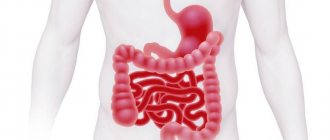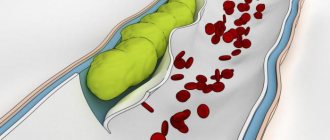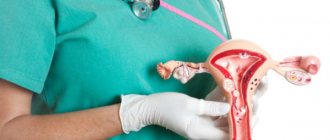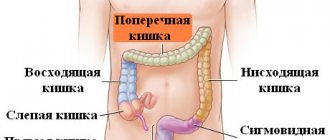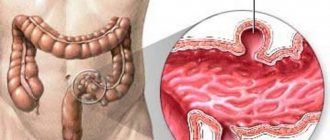Causes of discomfort
Colic is a spasm caused by severe bloating and overexertion of the muscles of the large intestine. Most often, its cause is untreated gastritis, impaired digestion and poor intestinal motility.
If we talk about intestinal spasms during pregnancy, this phenomenon is caused by the movement of the egg into the uterus. The first symptoms of colic can be observed one to two weeks after conception. It is worth remembering that many changes, including abdominal discomfort, are triggered by hormonal changes in a woman’s body. Active growth of the fetus can cause systematic stabbing pain in the lower abdomen, and may also manifest as slight bleeding.
In rare cases, pregnancy is accompanied by constant feelings of anxiety, worry, stress and worry. This condition causes physiological problems: colic, insomnia, poor digestion.
If you experience persistent bowel spasms during pregnancy, it is important to notify your consulting physician. If colic accompanies the process of eating or defecation, and the discomfort continues for a long time, the doctor may recommend observation in a hospital.
Spasms and convulsions of the muscles of the lower extremities
Leg muscle cramps with spasms occur when the metabolism of calcium and phosphorus is disturbed. The same symptoms occur when the enlarged uterus compresses adjacent large nerves.
Other reasons: physical overload of the body, prolonged standing. If cramps and spasms begin to recur frequently, the doctor prescribes blood tests followed by correction of phosphorus-calcium metabolism.
When calcium deficiency occurs, the pregnant woman is given medications containing calcium.
Other recommendations for a pregnant woman with cramps in the leg muscles:
- Do not lift or move heavy objects.
- Reduce the amount of time you spend in a standing position.
- Limit physical activity as much as possible, avoiding overwork of the body.
- Exclude buckwheat, fish, oatmeal, and legumes from the daily diet.
How does it hurt?
If a woman experiences pain and intestinal spasms during pregnancy, it is necessary to find out what specific sensations the expectant mother experiences. As a result of a thorough diagnosis, the presence of pathologies associated with the intestines is revealed. Perhaps the reason lies in increased gas formation or altered hormonal levels.
If intestinal colic occurs, you need to pay attention to such nuances as:
- spasms or pain;
- mild, moderate or acute severity;
- location: in the hypochondrium, navel, side or lower abdomen;
- sudden and short attacks or prolonged and regular pain.
To understand the nature of discomfort, pain and intestinal spasms during pregnancy, it is important for the doctor to conduct an internal and external examination. It is necessary to determine what exactly causes the cramps and how to eliminate them without harm to the child.
How to eliminate intestinal colic during pregnancy? – Traditional methods
To begin with, you should use the easiest methods - intestinal colic during pregnancy can go away after regular rest. Relaxing the body relieves spasm, and with it the pain goes away.
You can put a warm (never hot!) heating pad on your stomach. Only here there are a number of mandatory conditions: if the stomach is acute and swollen, this method is strictly prohibited. Overheating of the uterus is also prohibited, so you should carefully monitor the temperature. If you don’t have a heating pad nearby, you can take a warm bath – this will also relax your entire body.
Physiology
During pregnancy, from the first trimester to the last days before childbirth, hormonal changes occur in the body. As estrogen and progesterone levels increase, muscles and ligaments relax, causing discomfort.
The digestion process worsens, due to the stressful state of the body, the muscles contract, which causes colic and intestinal spasms during early pregnancy, usually in the right or left side. The pain goes away after the hormonal levels stabilize. In such a situation, it is advisable to consult your doctor and take a vitamin and mineral complex for pregnant women.
Renal colic in pregnant women
Renal colic is usually a consequence of exacerbation of pyelonephritis or the development of urolithiasis. Sharp pain most often occurs suddenly, localized in the place where the stones were formed and located. When the next attack occurs, the heart rate slows down, intestinal paralysis, arterial hypertension and even fainting occur. The duration of the spasm is from 10 minutes to several hours.
Self-administration of any medications, use of heating pads and steaming in a hot bath are contraindications, and to avoid the unpleasant consequences of such pain, a pregnant woman should consult a doctor.
Miscarriage
Nagging pain with spasms in some cases indicates premature birth or miscarriage. A more accurate diagnosis depends on the stage of pregnancy. Premature birth, as a rule, is accompanied by bloody discharge, pain symptoms radiating to the lumbar region, increased tone of the uterus and dilation of the cervix. If intestinal spasm does not go away for a long time during pregnancy, only the attending physician can decide what to do in this case.
If you do not start timely treatment, the outcome can be extremely disastrous, including involuntary miscarriage. Termination of pregnancy in some cases causes the risk of thrombohemorrhagic pathologies and infection in the woman’s body. Therefore, you should be attentive to your health, and if you have nagging pain, immediately consult a specialist.
When does pain in the uterus indicate a threat to the fetus?
So, in some cases, pain in the uterus is absolutely normal, and in some cases it is caused by problems in other parts of the body. However, there are situations when the uterus hurts due to a real threat to the life and health of the unborn baby:
- For hypertension. As already mentioned, the condition of the uterus as a whole is largely determined by the condition of its muscles. Normally, they should not be in good shape all the time, so as not to cause rejection of the fetus. A special hormone, progesterone, which is actively produced during pregnancy, is responsible for this inside the female body. But, as you know, the hormonal system sometimes malfunctions. If there is insufficient progesterone, the uterus can become hypertonic, which will cause both cramping pain and the threat of miscarriage.
- With premature placental abruption. It can occur due to injury, excessive physical activity, and a number of other reasons. This process is usually accompanied by nagging pain and also creates a threat of spontaneous fetal rejection.
Placental abruption
If the expectant mother is injured, toxicosis or an acute viral disease, the placenta may partially exfoliate. As a result, the blood supply to the fetus is disrupted, nutrients are supplied in less volume, and the life and health of the child are endangered.
Placental abruption is accompanied by the following symptoms:
- pronounced pain in the abdomen and uterus;
- intestinal spasms in early pregnancy;
- opening of slight or heavy bleeding;
- deterioration of the fetus;
- If the placenta detaches centrally, there will be no visible bleeding because the discharge penetrates the walls of the uterus.
Most often, this type of pathology occurs in the first trimester of pregnancy. If measures are not taken in time, the deviation will progress and the fetus will die in the womb.
Cramps in late pregnancy
Being in the third semester, the body is preparing directly for childbirth. To prepare, he conducts a kind of teaching for the woman. The former feel intense pain, the latter feel nothing.
Spasms in the lower abdomen indicate that the cervix is decreasing in length, and the cervix is opening, preparing to release the baby into the world. But not all pain prepares you for childbirth. Spasms are known to indicate difficulties in the body that threaten the fetus and the woman.
Harmless spasms
Poor nutrition can cause spasms in the organs involved in the process of digesting food. A heavy dinner, insufficiently fresh food, too fatty - can provoke pain in the abdominal area - dysbacteriosis, colitis.
Sprained ligaments also cause pain. The abdominal muscles are subject to constant tension. For such pain to go away, you need to lie down and rest.
To relieve the symptoms of intestinal obstruction, you should maintain a water balance, not exceeding the norm of water consumption, and eat more fresh fruits and vegetables. If you want to boil and bake vegetables, avoid fried and canned foods.
Dangerous spasms
Painful symptoms occur in the last stage of pregnancy when there is a threat of miscarriage. The pain is aching and does not subside, reminiscent of contractions. Discharge from the woman’s genitals is observed. In this case, seek medical help immediately!
Less common are pain in the lower back, when the uterus seems to turn to stone. These are false contractions and are dangerous at less than 37 weeks. When the interval between spasms decreases and the pain in the lower abdomen increases, there is a threat of miscarriage or premature expulsion of the fetus. Need emergency medical help.
Cramps in the lower abdomen during pregnancy are quite common. When spasms do not greatly disturb a woman, there should be no reason to panic. Mild spasms, as medical practice has shown, subside on their own without turning into more serious muscle contractions.
Another thing is if spasms cause pain, you need to urgently visit the women's office or call an ambulance team. Problems with abdominal cramps are very rare in pregnant women who are constantly under the supervision of a doctor.
Cramps during pregnancy often worry women who have previously had problems with bearing a fetus, miscarriages, and conceiving a child. One should take into account the theory that indicates the recurrence of negative phenomena during pregnancy. The antenatal clinic doctor constantly works with the pregnant woman, inspiring her to be calm and optimistic in order to facilitate the process of bearing a child.
Intestinal diseases
Colic in the gastrointestinal tract may indicate a disease of the organ itself. This is usually associated with infectious or inflammatory pathologies. Failure to comply with the diet by the expectant mother causes disturbances in the functioning of the digestive tract, accompanied by colic and intestinal spasms during pregnancy; the 2nd trimester is especially indicative - discomfort in the abdominal cavity manifests itself especially sharply. If a woman suffered from a stomach ulcer or gastritis before conception, this can also cause an exacerbation of the disease. A chronic inflammatory process is observed in the presence of Corn's disease and colitis.
Infectious problems arise due to viruses or E. coli entering the body. They are expressed by the following symptoms:
- stabbing pain in the side or around the navel;
- gas formation and pain in the abdomen;
- diarrhea;
- temperature increase;
- excrement excreted with bile formations, blood or mucus.
If this is only irritation of the intestinal mucosa, then there will be no bowel disturbances, as well as discomfort during sleep.
Diagnostics
An accurate diagnosis is established based on the results of medical studies:
- Urine tests (sometimes a study of daily diuresis is required).
- Blood tests (general and biochemical).
- Ultrasound of the abdominal cavity.
- Ultrasound of the pelvic organs.
Urinalysis provides information about the density, chemical composition and presence of foreign matter (blood, epithelial cells, etc.).
In a blood test, attention is paid to sugar levels, hemoglobin and leukocyte content, and erythrocyte sedimentation rate. An increase in the last two indicators indicates an inflammatory process in the body.
Ultrasound of the pelvic and abdominal organs is a research method that allows you to see internal processes in the urinary organs, liver, pancreas and intestines, as well as in the enlarged uterine cavity.
Correct treatment can be prescribed when the cause of problems in the body is correctly identified.
Medicines for pregnant women are prescribed exclusively by a doctor. To reduce the amount of gases in the intestines, Espumisan is recommended, and No-shpu is recommended to relieve pain. These are the safest and most effective of medications.
It is recommended to follow a diet: as already mentioned, you will have to remove sweet, fatty, fried, smoked and spicy foods from your diet. Products containing dyes, artificial flavors and preservatives are excluded. Carbonated drinks and foods high in salt are not recommended.
The temperature of the food should be slightly higher than room temperature, and the meals should be divided: you need to eat often and in small portions. The table must have fermented milk products, baked apples, lean fish and fresh herbs, which will improve digestion and enrich the body with useful micro- and macroelements.
Physical activity will contribute to healing: regular walks and gymnastics will help improve intestinal motility and reduce the likelihood of constipation. All physical exercises should be done no less than forty minutes after eating.
The absence of stress will have a positive effect on the results of treatment of colic during pregnancy and will ensure a happy outcome of the pregnancy.
Traditional medicine methods to combat intestinal spasms in pregnant women
Traditional medicine will come to the aid of expectant mothers, capable of relieving symptoms during a painful period of deterioration.
Fennel tea will relieve intestinal colic. Fennel seeds are purchased at the pharmacy. A supply of such tea will not be superfluous: the drink is used to treat similar phenomena in newborns. For the expectant mother, tea is brewed stronger.
Chamomile decoction is a natural anti-inflammatory agent that can partially overcome anxiety and restlessness. A teaspoon of dried chamomile is poured into 1 glass of boiling water and left to infuse. Take a teaspoon of the decoction every 2 hours.
A good remedy is a decoction of oak bark with calamus and angelica. Eliminates cramps and bloating. To prepare, you will need 1 tablespoon of each ingredient and a liter of boiling water. The decoction is infused for 1 hour. The effect will be positive if the dosage is observed: you need to drink 2 tablespoons 3 times a day.
Inflammation
The presence of pathological processes in the genital organs of the expectant mother is most often indicated by pain in the lower abdomen and intestinal spasms. During pregnancy, the symptoms of such diseases appear as follows:
- aching, nagging pain radiating to the intestines;
- pain during examination by a gynecologist and palpation of the abdominal cavity;
- temperature increase.
Severe abdominal pain in some cases indicates peritonitis, a serious inflammatory disease. Therefore, at the first manifestations of illness, it is necessary to immediately undergo examination and begin treatment in order to avoid complications.
Symptoms and signs of intestinal colic during pregnancy
Intestinal colic during pregnancy is difficult to confuse with something else based on its symptoms and signs:
- sharp cutting pain in the lower abdomen (women who have already given birth can compare it with contractions);
- bloating;
- severe flatulence;
- diarrhea or constipation;
- the presence of mucus in the stool;
- nausea and vomiting accompanied by loss of appetite;
- weakness in the body;
- high blood pressure.
The duration of pain attacks may vary. It is possible that a woman suffers from pain for several hours, then there is a “break” - also for several hours - and then the pain resumes, and so on - for a whole day. In this case, problems with urination and false urge to defecate are possible.
Severe intestinal colic during pregnancy, the symptoms of which last too long, require immediate medical intervention.
Pathologies of the genitourinary system
Often, intestinal cramps and abdominal pain are caused by problems in the urinary tract. In this case, pain and discomfort appear in the genitals. Acute pain can occur against the background of urolithiasis, with the development of cystitis.
Pathologies of the genitourinary system can be identified by the following signs:
- cloudiness of urine, the appearance of small particles or inclusions of blood;
- frequent urination, accompanied by pain.
Often, cramps and colic indicate pathological abnormalities, so it is urgent to take tests and undergo an examination, based on the results of which the doctor will prescribe therapy.
Treatment
Therapy for the expectant mother should be strictly under the supervision of a doctor, since the risk of harming the fetus increases many times over. First, you need to consult with a gynecologist and gastroenterologist and undergo an examination to determine the cause of intestinal spasms during pregnancy. Only a specialist can decide what to do in such cases.
After making a diagnosis, the attending physician will prescribe medications that a woman in her position is allowed to take. All medications must be taken according to the instructions and in the prescribed dosage. To eliminate the symptoms of the disease, the following are usually prescribed:
- "No-spa" - as an anesthetic.
- "Espumizan" - to relieve spasms.
- Antibiotics and drugs that restore intestinal microflora.
The dosage of medications should be determined by the consulting physician.
Treatment of intestinal colic during pregnancy
To cure intestinal colic during pregnancy, it is necessary to localize the source of its occurrence. Painkillers will not eliminate the problem, only reduce the symptoms of pain. Pregnant women should not worry that medications may harm the baby. The problem of the body is not a serious illness, it is just intestinal colic during pregnancy, the treatment of which does not require the use of potent drugs. The use of medications without a doctor’s prescription, however, is still categorically not recommended.
The initial spasm will help remove the drug No-Spa, which is generally recognized as a harmless remedy during pregnancy. The second safe drug that is prescribed even to infants is Espumisan. The components of the drug do not enter the blood or gastrointestinal tract of a pregnant woman and cannot harm the baby in the womb.
First of all, you need to consult with your obstetrician-gynecologist who is managing your pregnancy. If he decides that additional specialist consultation is required, then the next doctor to contact is a gastroenterologist. A gastroenterologist will help determine the exact cause and monitor the development of colic, and depending on its nature, may prescribe a number of medications:
- If it's just a spasm, antispasmodic drugs will help. They will relieve muscle tension and the discomfort will end.
- Enzymatic preparations have a beneficial effect on the digestive system and regulate metabolism. In general, they are a supportive therapy, but for intestinal colic they can become the only necessary medicine.
- Anti-inflammatory drugs are prescribed when the doctor sees the beginning of an inflammatory process in the intestines. These are more “heavy” medications, but among them there are also those that can be taken by pregnant women.
If, after consulting a doctor, you are concerned about a detailed diet, including recipes, you need to make an appointment with a nutritionist. The doctor will select the optimal diet and share healthy recipes to keep you full and in good spirits.
Diet
While carrying a child, it is very important for the expectant mother to eat a healthy and balanced diet. Products should be healthy, high in nutrients and vitamins.
The diet for pregnant women includes the following recommendations:
- It is important to maintain the body's water balance and drink healthy drinks: freshly squeezed juices, smoothies and tea.
- It is necessary to limit the consumption of salty, spicy, fatty, smoked, fried foods and semi-finished products. If a woman really wants one of the listed products, then it is advisable to eat them no more than twice a week in small portions.
- The amount of flour products and sweets also needs to be reduced. It is allowed to consume marshmallows, marmalade, and dark chocolate in minimal quantities.
- It is advisable to remove from the diet foods that cause increased gas formation: cabbage, grapes, legumes and others. They cause intestinal cramps during pregnancy. In case of multiple pregnancy, this is especially important, since the organs inside are strongly compressed, and gases, expanding, cause pain.
Food should be steamed or baked in the oven, stewed or boiled. Pregnant women are prohibited from smoking, drinking alcohol and using drugs. During this period, it is especially important to take vitamins and eat fresh fruits and vegetables. It is better to avoid citrus fruits for a while. During the day, food should be taken 5-6 times, in small portions. The last time you eat is allowed no later than two to three hours before going to bed. At the same time, food should be light and quickly digestible. This is also important for preventing bowel cramps during later pregnancy, when gases can have a very strong impact on compressed organs.
Is it possible to avoid unpleasant sensations?
It is unlikely that you will be able to completely avoid tingling in the uterus, but a few simple rules will help you significantly reduce the likelihood of their occurrence during pregnancy and avoid the development of dangerous pathologies.
- Avoid overtiring. During pregnancy, you do not need to constantly stay in bed, but physical activity should be distributed wisely.
- Every morning, do light exercises for pregnant women, provided that everything is in order with the tone of the uterus.
- Spend more time outdoors.
- Avoid sudden changes in body position; do all actions slowly and smoothly.
- If you experience tingling sensations, take a warm shower, this will relax your muscles well.
- Essential oils of mint, lavender, and jasmine have a good relaxing effect. Add a few drops to the aroma lamp and try to relax as much as possible.
- In later stages, wear a bandage, but just do not tighten it too much.
- If you are often bothered by flatulence, exclude all types of cabbage, potatoes, white flour bread, grapes, and legumes from your diet. Be sure to include fermented milk products, fresh fruits, herbs, and rye bread in your diet. Eat often, but in small portions.
If tension in the uterus is caused by stress, nervous experiences, drink chamomile tea - brew 200 ml of boiling water, 2 tsp. inflorescences, leave in a sealed container for 10 minutes, strain, add a little honey. Mint, lemon balm, and motherwort have a beneficial effect on the functioning of the nervous system, but even the use of folk remedies should be coordinated with a doctor.
Prevention
You can prevent the occurrence of intestinal colic and not harm the baby by regularly performing abdominal massage. Simple manipulations improve digestion and reduce gas formation in the stomach. To do this, every day the stomach is massaged with circular stroking movements in a clockwise direction for ten minutes.
Every two weeks it is recommended to have a fasting day to cleanse the intestines. At this time, they eat only porridge, fresh fruits and vegetables, and drink as much water or tea as possible. It is useful to carry out acupressure of the body. It has a beneficial effect on the functioning of the gastrointestinal tract, eliminates discomfort, and improves well-being.
To reduce gas formation during pregnancy, you should avoid drinking alcoholic and carbonated drinks, as well as coffee. Among other things, it is recommended to follow a diet for pregnant women, walks in the fresh air, and an active lifestyle. In this case, the risk of intestinal pathologies is reduced, the child develops correctly, and the pregnancy proceeds well.
Intestinal cramps are a fairly common problem for expectant mothers. As a rule, it occurs due to poor nutrition, hormonal changes or a sedentary lifestyle. Before you panic, you need to consult a doctor, undergo an examination and determine the reasons for your poor health. To avoid health problems, you need to eat well, get sound and restful sleep, and spend more time in the fresh air.
Cramps in the early stages
Many women, being in the first trimester of pregnancy, complain of a painful sensation in the abdomen. There are situations when urgent hospitalization is necessary, and there are situations when you don’t have to rush to see a doctor. You should pay attention to how intense the pain is, where the source of the pain is, where it radiates.
Cramps during pregnancy can occur suddenly, be sharp, or be constant. Sometimes the spasms resemble contractions - they increase, decrease, or do not stop. Depending on the area where the pain comes from, it is possible to roughly determine the area of attention. At the top of the abdomen, the stomach or pancreas hurts; in the area of the navel, the intestinal tract signals.
Spasms in expectant mothers in the first trimester are divided into two types: safe and dangerous. The first type of pain is temporary, associated with the natural course of the process of bearing a child. The fetus grows, the organs become slightly deformed, and the hormonal levels change. The latter are associated with serious diseases and cause miscarriage or infection of the fetus.
